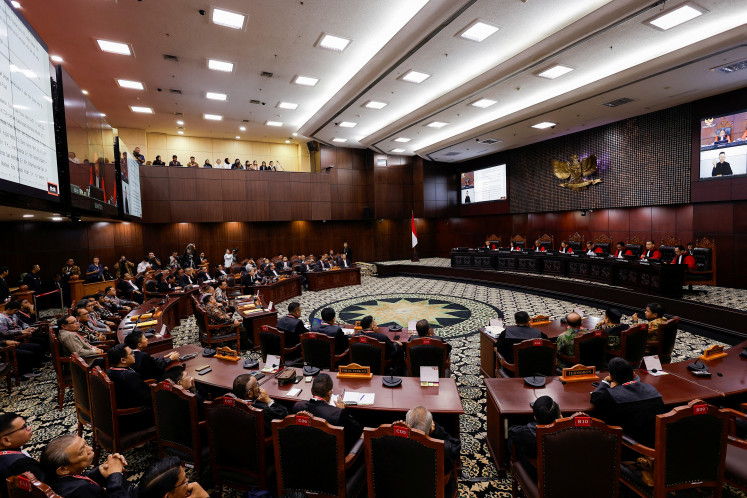News Analysis: The politics of transitions and transactions in the new govt
As losing presidential candidate Prabowo Subiantoâs Constitutional Court case becomes a national sideshow, and with president-elect Joko âJokowiâ Widodo refocusing himself on gubernatorial duties, political chatter has been absorbed on the transition team of the incoming administration formed last week
Change Size

A
s losing presidential candidate Prabowo Subianto's Constitutional Court case becomes a national sideshow, and with president-elect Joko 'Jokowi' Widodo refocusing himself on gubernatorial duties, political chatter has been absorbed on the transition team of the incoming administration formed last week.
The team raised eyebrows not only because of its timing but also because it is headed by former president director of PT Astra International and former industry and trade minister Rini Mariani Soemarno Soewandi.
Speculation has arisen not only about the team's purpose, but also the suspected political maneuvering behind its establishment. So much so that skeptics have spun it not as a transition team but as a 'transaction team'.
By all accounts the team was principally the initiative of the president-elect. There had been internal discussions on establishing such a mechanism, a novel idea in Indonesian politics; however, it seems that it was Jokowi himself who initiated its execution on his own accord, including Rini's appointment.
It is a bold yet potentially risky move. A political gambit that asserts authority while allowing the substantive work of government preparation to be done without the distraction of Cabinet horse-trading.
The team is in part a projection of Jokowi's growing confidence and power.
The fact that the chairman of the Jokowi-Jusuf Kalla presidential election campaign team and certain parties are being shut out and not even included as advisors speaks volumes as to the message being sent.
It underlines Jokowi's consistent rejection of being beleaguered by demands for Cabinet posts and outside influence.
That in itself is well and good. However, he is also risking alienating various factions of his support group at a very early stage.
On paper, the work of the transition team is very much an apolitical technical working group.
Four deputies have been appointed with specific designated general responsibilities: the first being responsible for budget and legislative issues; the second to review Cabinet structure, the third on agriculture and fisheries and the fourth on infrastructure.
To detail the work further, as many as 16 working groups are being formed to help study and formulate concrete measures for the incoming government. Each will be responsible for a general area of competence and tasked with presenting a set of objectives for the new administration that are synchronized with campaign promises and the immediate conditions faced by the country.
It is expected that the first draft of these working groups' proposals will be completed before the end of the month.
Critics have lamented the over-exuberance of forming a transition team before the final verdict of the Constitutional Court, which is not due until next week. However, the deadlines being dictated to the working groups may also excuse the urgency of such a move. It is estimated that a final report is expected to be handed to the president-elect by Oct. 1.
While priorities and plans are commendable, one of the key challenges of the new administration will be to break up the 'business mafias' that have embedded themselves and monopolized key sectors.
Do not be surprised if the working groups are also tasked with identifying the vested interests in their respective sectors that are regarded as impediments to a transformative policy.
Another point of speculation that will likely emerge is if, or when, the individual working groups begin identifying a pool of talent for each field to function as present and likely future resource persons.
While this pool of talent will comprise experts, conceptors and innovators, there is nothing to stop the public from speculating that they, along with members of the working groups and transition team, are on the short list for Cabinet posts.
It has been repeatedly asserted that being a member of the transition team does not necessarily qualify someone for a Cabinet post. Yet neither can it be denied that the essentials of the working groups' findings can serve as criteria to select a potential Cabinet minister.
What will be most intriguing after next week will be to observe the interaction and exchanges of the transition team with those of the outgoing administration.
One of the key realities that has to be faced and matched is that given growth expectation this year is 5 percent or less, will the new administration and its wishful plans have any fiscal leeway to be so ambitious?
This transition team is a novel approach in the history of Indonesian statecraft. But then again, there has never before been an election like the recent one. It is a move that shows intent and determination on deliverables rather than protocol and state pomp, yet also filled with unwieldy hazards of misperception and conjecture.
If anything, it demonstrates again the cunning of the president-elect and shows that, good or bad, he will be a president like no other.









